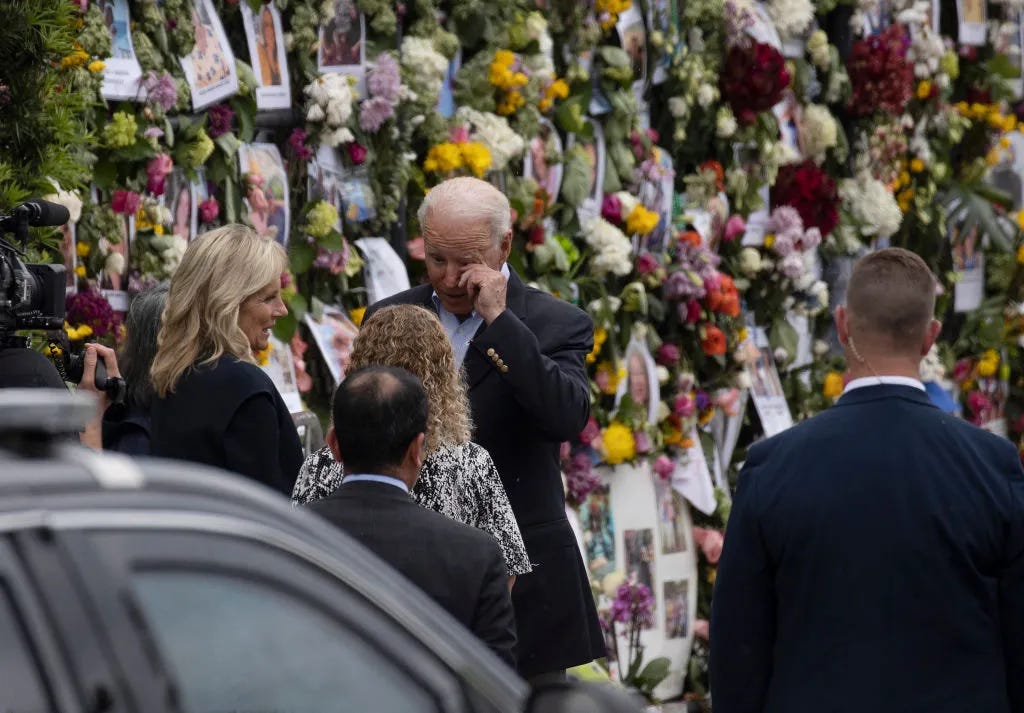The Need for Compassion (redux)
In all times, America benefits from compassionate leaders
I wrote this essay nearly two years ago, on July 13, 2021, in the final weeks of my mother’s life. Now facing the grave illness of another family member, I returned to this piece of writing and realized it would be valuable to share now, whether you’ve never seen it before or you’re reading it for a second time. Hold your loved ones close and spread a little kindness.

I’ve been dealing with a serious family illness, which has gotten me thinking about compassion and the need for compassionate leadership. America has lived through a series of years defined by an absence of compassion—the utter indifference and inability to recognize what others are feeling, then the failure (or refusal) to make decisions and act in ways that can improve the lives of others. We all know how this sociopathy has poisoned the body politic and continues to drive GOP leadership, bent on emulating this grievous path of pain, no matter how much additional suffering it causes.
No matter where you reside along the political spectrum, Joe Biden’s compassionate character and his deep wellspring of empathy is impossible to miss. Whatever one’s view of how this influences his eventual decisions, it’s impossible to not comprehend that the death of his wife and daughter when he was a young man and the death of his beloved son Beau to brain cancer are deep wounds that have taken him on a journey to recognize and respond to human suffering.
I was about to write that times like these require that kind of a person and that kind of compassionate leadership. I believe that fully. But I also realize that that kind of person and that kind of leadership is needed at all times. Imagine the Civil War without Abraham Lincoln. We may quickly think about the consequences for the war’s outcome, the impact on the ending of slavery and the saving of our republic. His role in these matters was profound, of course, but so was his capacity for compassion at the most basic human level. It’s what we call these days the role of Consoler-in-Chief.
Consider the letter Lincoln wrote in 1862 to Fanny McCullough, whose father was killed in battle. Lincoln was still grieving for Willie, his 11-year-old son who died in the White House earlier that year.
“In this sad world of ours, sorrow comes to all. And to the young it comes with bitterest agony. … You can not now realize that you will ever feel better. Is this not so? And yet it is a mistake. You are sure to be happy again … I have had experience enough to know what I say; and you need only to believe it, to feel better at once."
In recent days, I’ve personally come to understand that some of the most important life-and-death decisions are not hard to make, no matter how hard the reality is, when you act based on love and human kindness. That may sound a bit like a Hallmark card, thoroughly uncool in a world that values cynical detachment, but I do think there are times to act with as much purity of heart as one can muster. The effect can be contagious, making the lives of others struggling to manage that much easier.
In our nation’s current battle between the forces of light and those of darkness—between people convinced that the way forward is through violence, hate and the cruel application of power and people who seek inclusion and kindness that recognizes and values America’s beautiful diversity—we all have a role to play. We can speak out for, vote and fight for, a better and more compassionate country. Or we can all witness as the house divided is brought down by the worst among us. I choose optimism and compassion.
America, America is sustained by paid subscriptions, making it possible to keep nearly all the writing available for everyone. If you’re not already a paid subscriber, I hope you’ll consider becoming one.


Mr. Beschloss, I wish you peace and comfort in your memories -- losing someone is a difficult path. I hope your words give you comfort as much as they do for us.
When my grown daughter was killed, I wished silently to go with her when I had to agree to ending her life support. Yet I have five grown children still. I'm 86 and I send each
what I call "lovegrams" by text. That's all. Lovegrams.